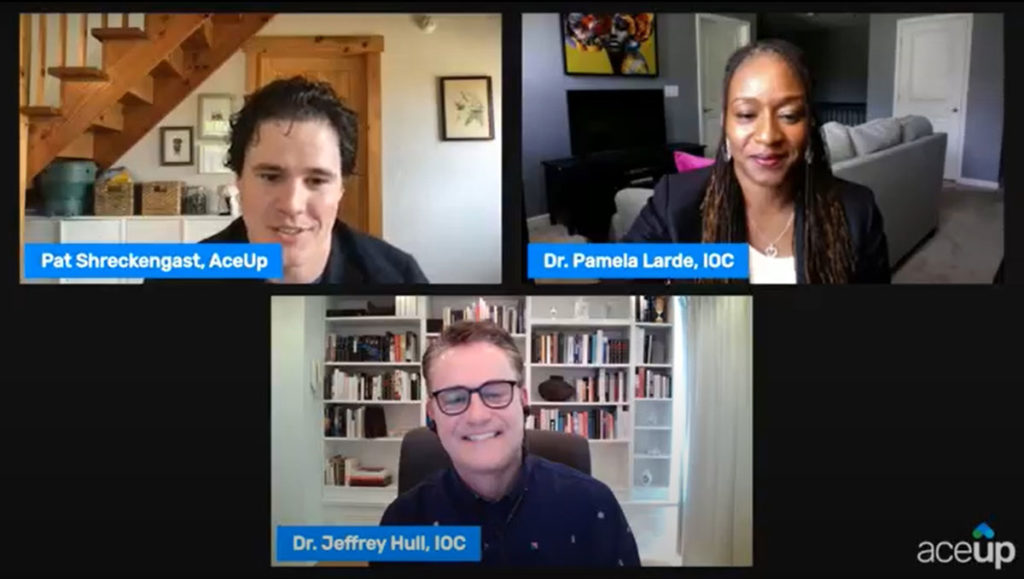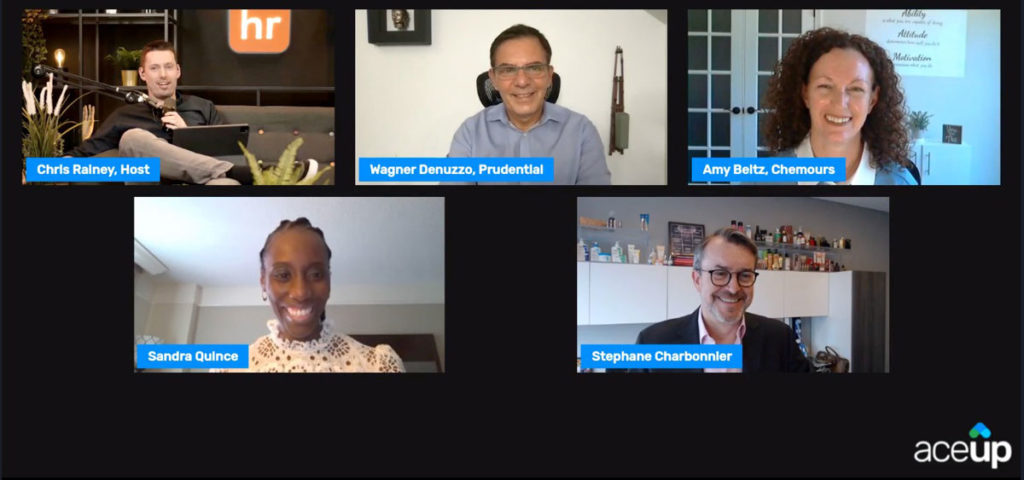Top 5 Takeaways from AceUp’s Virtual Summit 2022
AceUp’s 3rd Annual Virtual Summit: Harnessing the Power of Human-Centered Leadership featured inspiring and innovative sessions by some of the brightest minds in HR, leadership development, and coaching. There were many actionable and timely insights shared on how to respond to and thrive in this new world of work we find ourselves in. Here are our top five takeaways from the event.
We need more human-centered leaders.

It’s a phrase we hear often in the new world of work, but what does being a human-centered leader mean? Dr. Susan David said it begins with developing compassion, curiosity, and courage to stay with a difficult emotion or to have a difficult conversation.
“These are human-centered skills,” she said. “They’re skills we can write into our strategies and they’re incredibly important.”
The focus is now on the whole human and the full range of feelings and emotions in the workplace.
“The world is changing and we, as humans, are evolving,” said David. “If we are truly going to be human-centered, it asks for a radical reconceptualizing of these kinds of skills,” David said. She went on to say that we need to recognize “that these skills are foundational to well-being, to mental health, to culture, to leadership, to every aspect of our organizations.
David added,
“And while they’re often seen as intangible, soft, and difficult to measure – that is not true. They are teachable, they are learnable, they are scalable, and they are powerful.”
Leaders benefit from leaning into their vulnerability.
People tend to hide their emotions because we’ve been taught that showing vulnerability can be interpreted as weakness. The truth is people need to be able to be vulnerable in all areas of life, including in the workplace. And they want their leaders to show this human side as well.
Dr. Jeffrey Hull, Executive Director of the Institute of Coaching (IOC) and a co-author of the IOC’s “Leading With Humanity” report, said, “The pandemic was obviously a period of pain and disruption for many of us. It also created an opportunity to seek out feedback on how leaders were working with these disruptive changes. The key is integrating human needs with productivity and with performance needs.”
The ability to be one’s true, messy, emotional self and encourage it in the workplace is a big priority today, and employees want their leaders to lead by example.
“The big takeaway from the report,” he said, “is that leaders recognize the need to be more human. Their effectiveness is connected to the effectiveness of their human population, so that leads to things like vulnerability and inclusivity,” and more.
“Because of what we’ve gone through over the last few years, it really has highlighted the need to no longer look at employees as cogs on a wheel,” said Dr. Pamela Larde, Director of Education at the IOC. “We have whole lives, and those whole lives impact what we bring to the workplace.”
Larde went on to say that leaders are realizing that it’s essential to hear the whole person and acknowledge the whole person, “or they’re going to lose people,” she said.

Employees want to feel psychologically safe.
Psychological safety allows employees to speak up with concerns or questions without the fear of negative repercussions or feeling shame or fear.
“In my view, psychological safety requires vulnerability,” Larde said, “and vulnerability requires psychological safety. Both elements have to come into play almost simultaneously in order to truly work.” She went on to say that one of the things they’re seeing that’s essential to psychological safety is a sense of belonging, alongside diversity, equity, and inclusion.
Hull added,
“It starts with leadership. It starts with leaders recognizing the importance of being role models for belonging and inclusion, and the starting point for that is to really step back and reflect on how they view words and meanings, like vulnerability or belonging.”
Leaders, he said, need to think about their role and what it means to be a role model.
“If you let down your hair as a leader, in some contexts, you may actually be increasing the likelihood of people on your team feeling comfortable, psychologically safe, and helped,” said Hull.

Leaders should focus on both performance and purpose.
Often we think we need to sacrifice performance for the sake of purpose. However, a human-centered approach enables purpose and performance to work in tandem, leading to even greater success.
“Purpose is the fuel that leads people to act in certain ways. Performance is the outcome of the conditions we create for people to be their best at work,”
explained Wagner Denuzzo, Head of Capabilities for Future of Work at Prudential Financial.
Leaders play a pivotal role in encouraging employees to be at their best. “When people come to work bringing their whole self, they are actually bringing their best self,” added Stephane Charbonnier, Senior VP of Human Resources and Chief Human Resources Officer at L’Oreal USA. “So you need to demonstrate to the leaders that by fostering that environment where people can do so, they will see better results, better outcomes, and better ROI with the time they’re spending and investing.”
Sandra Quince, CEO of Paradigm for Parity, agreed. “It’s putting people over process. It’s really thinking about how we create not just managers, but really good leaders who are inclusive.”
We need irresistible organizations.
More companies are struggling with hiring than ever before, and prospective employees practically have their pick of career paths. They’ve left jobs in droves during the last year, and now they are being more careful and conscious about which organization they want to hitch their proverbial wagon to. What makes a great company stand out?
“In today’s economy, after all this technology and AI and the pandemic, there isn’t a company left that isn’t dependent on the passion and skills and alignment of their people,” said Josh Bersin, Founder of the Josh Bersin Academy.
“You can’t just flip people out, replace them, and assume the company’s going to work well,” said Bersin. “Human-centered leadership is really just about remembering that and constantly developing your skills as a people leader – not just a business leader. It’s not like somebody wakes up one day and becomes a perfect leader. All leaders are learning all the time.”
The signs of an irresistible organization, he added, include high levels of employee retention, high levels of productivity, and people sharing new ideas and creating new solutions. Bersin also said these companies actively have growth taking place with people developing themselves and moving around inside of the company in a positive way.

“And usually, you’re profitable,” he said. “What makes companies profitable is not pushing the financials. It’s over-exceeding customers’ expectations in many ways, so customers are willing to pay more for what you offer. The reasons customers do that is because they love your products or they love your company or they love your people.”
Are You Ready?
Get in touch with us to schedule a demo and see how AceUp can help you build a premier coaching program for your top talent.